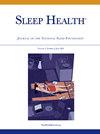The bidirectional relationship between sleep and daily burnout‐related experiences: Self-report vs. actigraphy-derived measures
IF 3.4
2区 医学
Q2 CLINICAL NEUROLOGY
引用次数: 0
Abstract
Objective
Although previous research suggests a link between sleep disturbances and burnout, little is known about the causal direction of day-to-day relationships between sleep and experiences related to burnout in nonclinical employees. This study explores the bidirectional relationship between self-reported and actigraphy-derived metrics of sleep and daily burnout‐related experiences (exhaustion, [a lack of] feeling positively challenged, and boredom) and whether these relationships depend on high vs. low levels of trait burnout.
Methods
Seventy-two employees participated in a 7-day experience sampling study.
Results
Disturbances in sleep quality predicted subsequent daily exhaustion and boredom, not the other way around. In contrast, a later sleep timing was related to feeling more positively challenged the next day, with a bidirectional relationship between feeling positively challenged and sleep offset. Moreover, trait burnout moderated the relationship between several sleep parameters and burnout-related experiences.
Conclusion
Experiencing disturbances in sleep while already experiencing trait burnout potentially drives the depletion of energy as found in burnout development and may thus be an important intervention factor to prevent the development of chronic burnout.
睡眠与日常倦怠相关经历之间的双向关系:自我报告与活动记录仪衍生的测量。
目的:虽然以前的研究表明睡眠障碍和倦怠之间存在联系,但对于非临床员工的睡眠和倦怠相关经历之间的日常关系,我们知之甚少。本研究探讨了自我报告和活动记录仪衍生的睡眠指标与日常倦怠相关体验(疲惫,[缺乏]积极挑战感和无聊)之间的双向关系,以及这些关系是否取决于高或低水平的特质倦怠。方法:72名员工参与了为期7天的体验抽样研究。结果:睡眠质量的紊乱预示着随后的日常疲惫和无聊,而不是相反。相反,较晚的睡眠时间与第二天的积极挑战感有关,积极挑战感与睡眠抵消之间存在双向关系。此外,特质倦怠调节了几个睡眠参数与倦怠相关体验之间的关系。结论:在经历特质性倦怠的同时出现睡眠障碍可能会导致倦怠发展过程中的能量消耗,因此可能是预防慢性倦怠发展的重要干预因素。
本文章由计算机程序翻译,如有差异,请以英文原文为准。
求助全文
约1分钟内获得全文
求助全文
来源期刊

Sleep Health
CLINICAL NEUROLOGY-
CiteScore
6.30
自引率
9.80%
发文量
114
审稿时长
54 days
期刊介绍:
Sleep Health Journal of the National Sleep Foundation is a multidisciplinary journal that explores sleep''s role in population health and elucidates the social science perspective on sleep and health. Aligned with the National Sleep Foundation''s global authoritative, evidence-based voice for sleep health, the journal serves as the foremost publication for manuscripts that advance the sleep health of all members of society.The scope of the journal extends across diverse sleep-related fields, including anthropology, education, health services research, human development, international health, law, mental health, nursing, nutrition, psychology, public health, public policy, fatigue management, transportation, social work, and sociology. The journal welcomes original research articles, review articles, brief reports, special articles, letters to the editor, editorials, and commentaries.
 求助内容:
求助内容: 应助结果提醒方式:
应助结果提醒方式:


